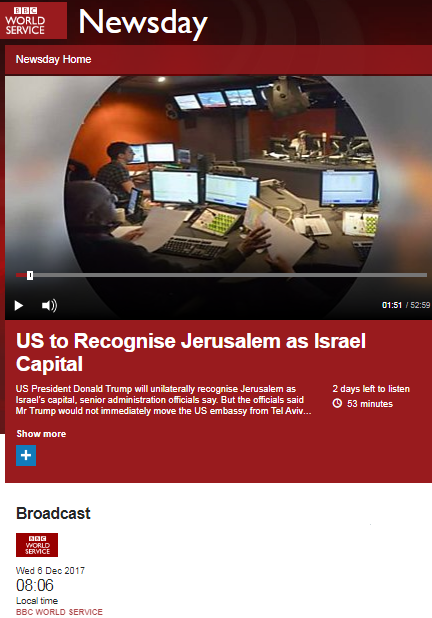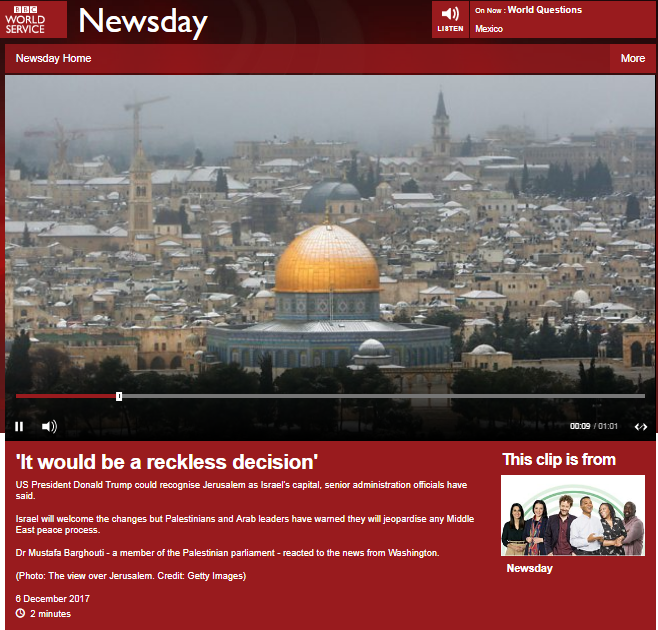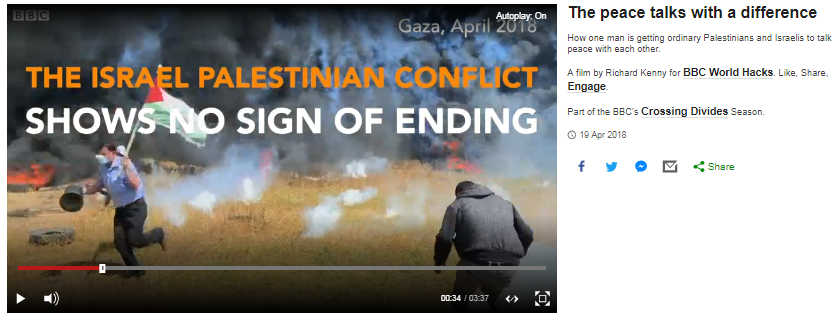Even before the US president had made his announcement concerning Jerusalem and the US embassy in Israel on December 6th, the BBC was already setting the scene.
As documented here previously, the BBC News website published several pre-emptive reports that framed the story according to a very particular narrative and thus shaped audience views of it even before anyone knew what the US president was actually going to say. Some BBC radio stations adopted the same strategy, with listeners hearing no small amount of speculative commentary prior to the actual event.
On the morning of December 6th the BBC World Service radio programme ‘Newsday‘ devoted much of the airtime in its various editions to the topic of the anticipated announcement. The commentary included contributions from several people selected to present ‘the Palestinian view’ that were remarkable for gross inaccuracies and distortions.
Did the programme’s presenters challenge those inaccuracies or did BBC audiences go away with misinformation and misleading impressions that would colour their view of the story in advance?
The early edition of ‘Newsday’ opened (from 00:34 here) with an introduction by presenters Lawrence Pollard and Andrew Peach that was immediately followed by a statement from Fatah official Nabil Shaath. [emphasis in italics in the original, emphasis in bold added]
Pollard: “Now let’s begin in the Middle East and…err…history and symbols hugely important there and there must be no more powerful symbolic expression than the city of Jerusalem.”
Peach: “Palestinians claim the eastern part of the city as their capital. Israel, which controls the city, claims it entirely as theirs. In circumstances such as these it’s not surprising that most other countries have kept well out of it until now and maintain their embassies in the Israeli financial capital of Tel Aviv, in the process withholding recognition of the Israeli claim to the entire city of Jerusalem.”
Pollard: “But now American president Donald Trump is preparing to recognise Jerusalem as the Israeli capital and move the embassy from Tel Aviv. America’s allies in Europe and the Arab world have been warning against the plan: a plan which President Trump promised on the campaign trail.”
Peach: “Lots of reaction coming for you, including this from Nabil Shaath – who’s a senior advisor to the Palestinian president – who says Mr Trump is throwing away his credibility.”
Shaath: “That totally destroys any chance that he will play a role as an honest broker. That takes away honest, takes away broker, takes away chaperone of peace, takes away the deal of the century and makes them behind us – gone into the files of history.”
Listeners then heard commentary from Ha’aretz journalist Anshel Pfeffer. Later on (from 26:55 here) the programme returned to the same topic.
Peach: “First, later today the US president Donald Trump is expected to recognise Jerusalem as Israel’s capital.”
Pollard: “He’s not likely to immediately move the US embassy from Tel Aviv to Jerusalem, partly because it will take several years, it’s said, to build a new embassy.”
Peach: “We’re told the US president has already telephoned several Middle East leaders to inform them of these plans. His regional allies were strongly against it all, warning of dangerous consequences.”
Pollard: “We’ve heard from Israel. Let’s get the opinion now of a member of the Palestinian parliament. Dr Mustafa Barghouti joins us once again on the programme. Dr Barghouti – welcome back. This has been a possible move for decades; now it’s coming. What’s its significance in your opinion?”
Pollard’s presentation of Barghouti as “a member of the Palestinian parliament” is of course misleading because not only has the Palestinian Legislative Council not functioned for over a decade since the Hamas coup in the Gaza Strip, but – like the rest of the PLC members – Barghouti’s term of office ended years ago.
Barghouti opened with a spurious reference to ‘international law’ that went completely unquestioned and went on – likewise unchallenged – to promote the ‘apartheid’ smear.
Barghouti: “It’s very significant but it’s very reckless – from a president who seems to be risk reckless on many issues. And it means the United States is officially participating in violating international law. And it is showing such a level of bias to Israel that it is killing any future role of the United States in any future peace process. As a matter of fact Mr Trump is aborting his own peace initiative before it is born. And the worst thing is that he’s making a dangerous move that will definitely destabilise the region and will consolidate, or help consolidate, a system of apartheid that Palestinians suffer from.”
Pollard: “Sorry. Let me just ask you about immediately what you think the consequences will be. First off, in the street – do you think that there is a risk of a violent response to this in terms of demonstrations and attacks?”
Barghouti: “No. From the Palestinian perspective we don’t want violence. We have opted for non-violent resistance but for mass popular non-violent resistance which was very successful last July in Jerusalem and we managed to defeat Netanyahu and force him to remove all obstacles he put in front of the people in Al Aqsa Mosque.”
Pollard failed to challenge Barghouti’s false claims of ‘non-violent resistance’ or to inform listeners of the incitement to violence from Hamas, the PA and Fatah even before the US announcement had been made. He also failed to clarify to listeners that his interviewee’s mention of “last July in Jerusalem” in fact refers to events triggered by a violent terror attack near Temple Mount or that those so-called “obstacles” were metal detectors and security cameras.
Pollard: “OK, so no violence in the street. OK, that’s an important point. What about…”
Barghouti: “I cannot guarantee it. I cannot guarantee that there will be no violence…”
Pollard: “Of course.”
Barghouti: “…in other places because this action is provoking the feelings of 1.6 billion Muslims, 2.2 billion Christians and 360 million Arabs.”
Pollard: “And politically, what difference does it make? You mentioned that in a sense – if I can put words into your mouth – it’s kind of destroyed the idea of America as the honest broker. Who else moves into that vacuum therefore? There is no-one else, is there?”
Barghouti used that question as a cue to promote the PA agenda of internationalisation of the conflict but listeners were not informed of the existence of that policy and so were unable to put his comments into context.
Barghouti: “There can be no one single country but I think we have…we moving in this world from unipolar system to multipolar system and if there would be a serious peace process it has to be an international conference with participation of many countries like China, Russia, European Union for sure. France tried to lead the road and it was obstructed by the United States and by Israel.”
Pollard: “But do you think that in any international arena…we have seen time and again an American veto used. Do you not think that simply any appeal or any hope that you’re now raising of an international effort to do it will simply be blocked or vetoed by the super-power; by the United States?”
Barghouti: “More than that. Any peace initiative will be blocked by Israel because Israel does not want peace, which is giving us a message. We the Palestinians have waited 25 years for the peace process to work. Now we receive the message it’s dead. Fine; we will choose an alternative path. We have to concentrate on changing the balance of power first. And that can happen only through popular resistance and a very wide large enhancement of boycott, divestment and sanctions against Israel like the apartheid system was treated in South Africa. We are fighting for our freedom in every possible way.”
Listeners were not reminded of the second Intifada terror war instigated by the Palestinians in 2000 or of the repeated Palestinian refusals of peace offers. Pollard failed yet again to challenge Barghouti’s promotion of the ‘apartheid’ smear as well as his promotion of the BDS campaign.
Pollard: “If America has gone against the opinion of many of its allies – European allies as well as Arab allies as well – do you think that this means that they have made themselves so close to the Israeli position that other groups such as for example the Europeans will be freer to have a more independent line?”
Barghouti: “Absolutely. But the Europeans need to be courageous. And they need to move forward and they need to move forward fast and quick. The problem they face is that they don’t have unity inside Europe. And that’s why I don’t think it should be a full European Union initiative.”
Pollard: “Right.”
Barghouti: “It should be an initiative by several countries like France, Germany and others.”
Pollard: “Now can you just clarify one thing because we’ve heard conflicting comments on the programme so far. This is a sort of technical point. In your opinion, by recognising the entirety of Jerusalem as Israel’s capital, does that de facto preclude East Jerusalem being a potential capital of a Palestinian authority?”
Barghouti: “It will…it will…of course. It means that it is considering East Jerusalem as part of Jerusalem because for Israel, Jerusalem is the united capital of Israel. Jerusalem is unified and that means that the annexation – the illegal annexation – of East Jerusalem which was occupied in ’67 and which is not accepted by anybody in the world, is considered part of the Israeli capital. That’s why unless the president says very clearly that East Jerusalem…I recognise East Jerusalem as the capital of Palestine, he’s practically participating in the crime.”
Refraining from providing listeners with any of the crucial historical context diligently erased by Barghouti, Pollard closed the conversation.
Pollard: “Right. Thank you for that.”
As we see, not only was Mustafa Barghouti not challenged on any of his falsehoods but he was allowed to promote his distorted narrative completely unquestioned. If that were not enough, the BBC World Service chose to further amplify some of Barghouti’s spurious claims in an edited clip from the interview promoted on Twitter.
There were, however, additional editions of ‘Newsday’ to come and they will be discussed in part two of this post.
Related Articles:
An overview of BBC News website coverage of the US embassy story




